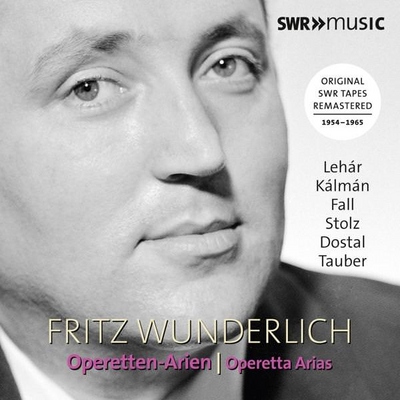Fritz Wunderlich sings Operettas Arias

Artikelinfo
1954–1965
2017
Emmerich Kálmán
Franz Lehár
Hans May
Jean Gilbert
Leo Fall
Nico Dostal
Ralph Erwin
Richard Tauber
Robert Stolz
Walter Triebel
Fritz Wunderlich
Rundfunkorchester des Südwestfunks Kaiserslautern
Emmerich Smola
Südfunk-Unterhaltungsorchester
Willi Mattes
Fritz Mareczek
Kleines Unterhaltungsorchester des Südwestfunks
Willi Stech
CD 1 Franz Lehár: Allein, wieder allein (from: Der Zarewitsch)
CD 1 Franz Lehár: Freunde, das Leben ist lebenswert (from: Giuditta)
CD 1 Emmerich Kálmán: Wenn es Abend wird … Grüß mir mein Wien (1924 - from: Gräfin Mariza)
CD 1 Emmerich Kálmán: Holdes berauschendes Bild (Liebe singt ihr Zauberlied - from: Kaiserin Josephine)
CD 1 Emmerich Kálmán: Schön ist der Tag (from: Kaiserin Josephine)
CD 1 Emmerich Kálmán: Du bist die Frau (from: Kaiserin Josephine)
CD 1 Leo Fall: O Rose von Stambul (from: Die Rose von Stambul)
CD 1 Jean Gilbert: Wenn die Füßchen sich heben (from: Die keusche Susanne)
CD 1 Jean Gilbert: Niemals kann Liebe ganz vergehn (from: Die keusche Susanne)
CD 1 Jean Gilbert: Wer kann dafür (from: Die keusche Susanne)
CD 1 Jean Gilbert: Mädels gibt es auf der Welt (from: Das Weib in Purpur)
CD 1 Jean Gilbert: Liebe und Glück, kehrt nicht zurück (from: Uschi)
CD 1 Hans May: Ein Lied geht um die Welt
CD 2 Ralph Erwin: Ich küsse ihre Hand, Madame
CD 2 Robert Stolz: Mädi, mein kleines Mädi (from: Mädi)
CD 2 Robert Stolz: Zum ersten Mal allein (from: Mädi)
CD 2 Robert Stolz: Einmal hat mir zur Frühlingszeit das Glück gelacht (from: Prinzessin Ti-Ti-Pa)
CD 2 Robert Stolz: Erst hab ich ihr Komplimente gemacht (from: Venus in Seide)
CD 2 Robert Stolz: Arrivederci, bella Italia (from: Signorina)
CD 2 Robert Stolz: Zwei sind verliebt (from: Signorina)
CD 2 Walter Triebel: Es gibt eine Frau, die mein Schicksal ist (from: Pfälzer Wein)
CD 2 Walter Triebel: Der Zauber liegt nur ganz allein (from: Pfälzer Wein)
CD 2 Walter Triebel: Pfälzer Wein (Medley)
CD 2 Nico Dostal: Wie tanzen dort die Paare (from: Extrablätter)
CD 2 Nico Dostal: Es ist doch äußerst interessant (from: Der Kurier der Königin)
CD 2 Nico Dostal: Ihr schönen Frauen, wer kann an euch vorübergeh'n (from: Der Kurier der Königin)
CD 2 Richard Tauber: Du bist die Welt für mich (from: Der singende Traum)
CD 2 Emmerich Kálmán: Kleiner Cowboy (from: Arizona Lady)
CD 2 Emmerich Kálmán: Wann kommt die eine, die ich liebe (from: Wir reisen um die Welt)
CD 2 Emmerich Kálmán: Du allein schenkst mir Leben
CD 2 Emmerich Kálmán: Ich träume nur von Liebe
Another installment from SWR's comprehensive series of Fritz Wunderlich recordings. A celebrated, must-hear voice. Unique compilation of operetta arias.
One of Fritz Wunderlich’s (1930–1966) most fascinating qualities was his incredible range of musical skills. He was probably Germany’s greatest tenor who could perform virtually anything in the repertoire for high male voice – from Schlager music to arias from J. S. Bach's Passions; from Mozart to music of the 20th century; from the greatest tenor hits of all times to unknown gems. His musicality and his seriousness as an artist turned everything he sang into something extraordinary.
The same can be said for his performances of operettas, lighter versions of grander opera. Operetta certainly enjoyed a heyday, and even today it still has its fans. Operettas have a high standard as far as the quality of entertainment is concerned, enjoying a higher standard than some opera seria of the Baroque period that were generally composed in a formulaic manner.
Operetta had its “Golden Age” in the second half of the 19th century, in Paris, where the Franco-German composer Jacques Offenbach (1819–1880) established “modern” operetta and took it to extremes in quite an intellectually stimulating and witty manner. Johann Strauss II (1825–1899) naturally became the king of operetta in Vienna.
Vienna's glorious “Golden Age” was followed by the “Silver Age”, which proved every bit as splendid. The period between 1900 and c. 1920 is mostly referred to as the “Silver Age” because numerous theatres were converted into operetta houses, or completely new premises were built for the purpose. Operetta composers of this era include Franz Lehár (1870–1948), Leo Fall (1873–1925), Emmerich Kálmán (1882–1953), Robert Stolz (1880–1975) and, more or less as head of the “German branch”, Jean Gilbert (1879–1942), whose real name was Max Winterfeld. You will repeatedly find all these names on this double-CD.
Whilst scaling the dizzy heights of opera, Fritz Wunderlich always found the time and motivation to sing operetta. He also held one of the leading lights of opera and operetta in the highest esteem: Richard Tauber (1891–1948), who once set the standard for both melodious, mellifluous and morose tenor parts in both Mozart operas and Lehár operettas, before he was driven into exile in London by the Nazis.
This double-CD features recordings produced in the studio Kaiserslautern prior to November 1965. Although in the early days of his career Wunderlich's vocal skills had not yet been fully developed, his unique qualities are heard here at their best – the distinctive voice with the silver core and the golden gleam.